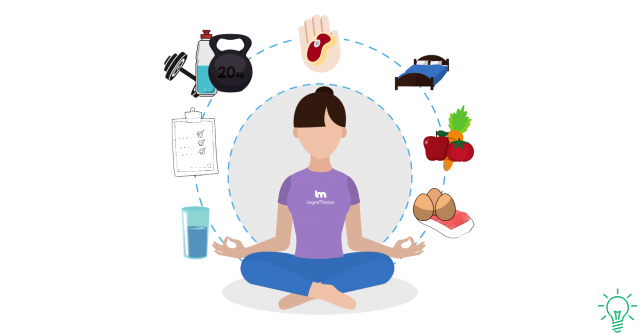We all want to acquire healthy habits. We propose it to us, in fact, on a cyclical basis. However, the data indicate that in most cases this desire boils down to one or two unsuccessful attempts. How come?

Last update: May 23, 2022
Why don't we eat fruit and vegetables every day if we know they are good for us? Why don't we exercise frequently if the benefits are known? Why do we find it a challenge to drink at least two liters of water a day? Building healthy habits is no easy task, as it takes time, dedication and effort.
The truth is that the human mind does not like changes, because they involve a great expenditure of energy. He prefers to remain in the known, in the predictable. Make sure that everything remains stable, that there are no unexpected events or novelties.
Think of that time at the airport when the loudspeakers announced that our face had been erased. How did we feel? Probably stressed, because this new information requires the brain to do extra work that it did not expect
In light of this, we tend to run away from changes. Let's see why acquiring and maintaining a habit is not easy and what to do to succeed.
What is a habit?
A habit is a behavior that is repeated in a systematic way. Many of the actions we perform are strengthened at the end of the day, to the point of being internalized and taken on as a way of life.
Once action becomes a habit, the mind no longer needs to strain. It will automate everything that it translates as a reward, that is, that causes pleasure.
Why is it often difficult to acquire healthy habits?
There are several reasons why we fail to consolidate and integrate some healthy habits into our routine. In the following lines we present the most common.
1. Because we focus on results
In most cases, when we set ourselves a goal, we tend to focus on results: losing weight, gaining muscle mass, getting a perfect complexion, etc.
Acquiring a healthy habit by emphasizing what you want to achieve usually generates the opposite effect, because restrictive strategies, such as diets, or excessive ones, such as intense physical activity, are often adopted: as a result, it is difficult to sustain them in the long term.
When we focus on the results, the rebound effect is more likely, which makes you regain a sedentary lifestyle and lost kilos. In his book Atomic Habits, James Clear states the following:
“The appropriate alternative is to pursue habits based on identity changes. With this approach, we start by focusing on who we want to become ”.
2. We are convinced that we cannot do it
We all have certain beliefs that we believe to be true. These guide our behavior, they can help us reach goals or limit us and act as obstacles. Our actions they reflect who we think we are.
“The human being always acts, feels and develops according to what he imagines to be true of himself and of the environment that surrounds him. We act and feel not according to reality, but according to the image of ourselves that we believe reflects. Habits, whether healthy or unhealthy, are formed in the same way ”.
-Maxwell Maltz-
If a person has thought all their life that they are good at sports, it will be much easier for them to engage in physical activity than someone who thinks that sports are not for them.
In both cases, the action is in tune with who we believe we are: there is harmony between conduct and identity. However, while it benefits one, it limits the other.
Do a profound job to question beliefs and rebuild the inner dialogue it is a valuable path to acquire healthy habits and leave harmful ones behind
3. Acquiring healthy habits is difficult because we lose motivation
Our mind loves simplicity; is very attentive to the cost-benefit ratio. In this sense, not getting immediate results, especially if you put in a lot of effort, tends to be demotivating and one of the main excuses we find for giving up. It motivates us to achieve goals with as little effort as possible.
To make a behavior automatic, we need repetition and time. What's better than making it easy and attractive?
When we define a simple action plan, specifying how, when and where you are less likely to lose motivation in the face of an adverse situation.
We are more likely to consume fruit if we keep it in a basket on the table or drink more liquids if we carry a bottle of water in our backpack every time we go out. To acquire healthy habits, we must make everything easier, therefore more bearable.

























